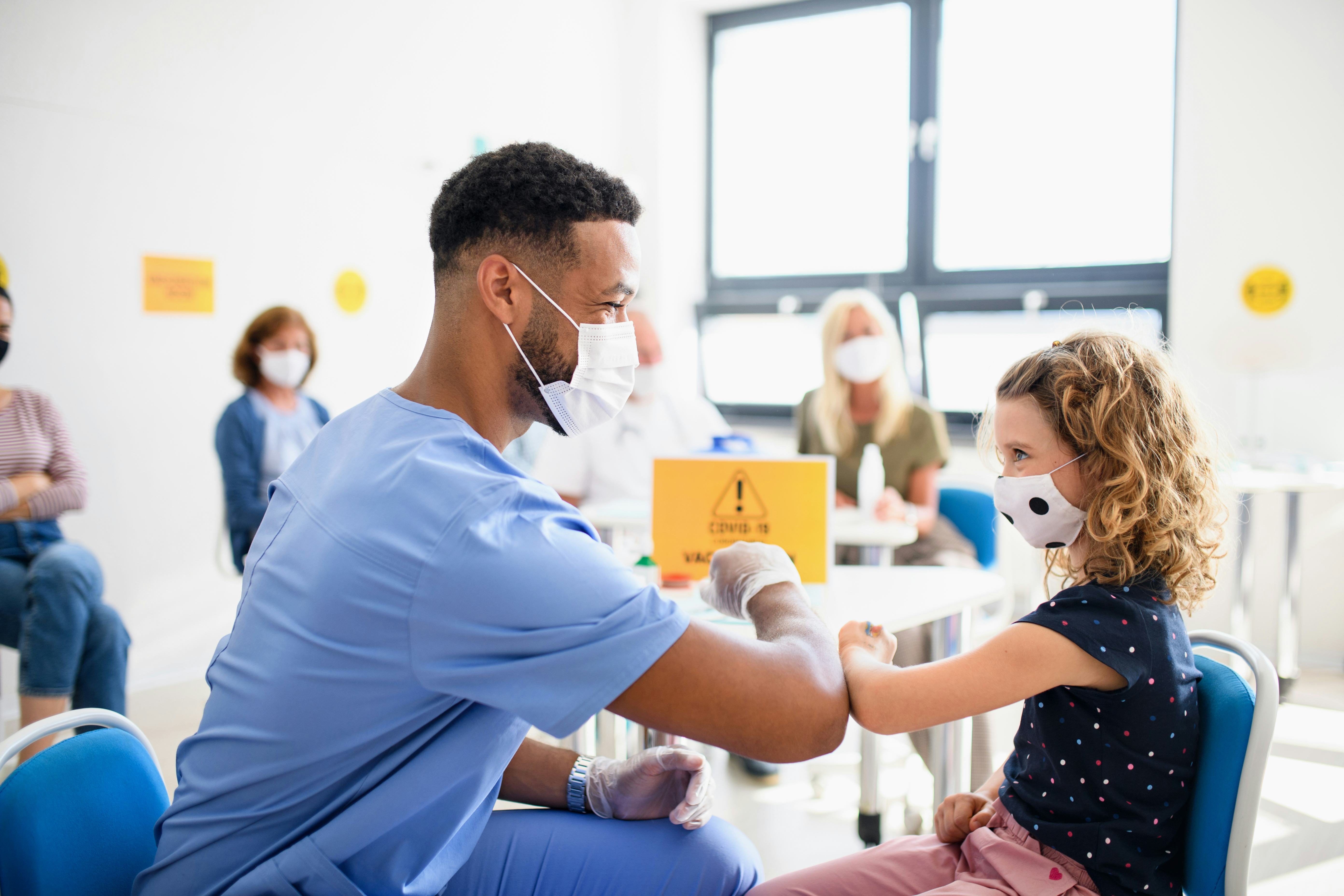
Now that some children are able to become vaccinated, parents are thinking ahead to vaccine schedules, appointments, and how to prepare kids for the side effects. Experts have told adults to take an ibuprofen prior to and after receiving the vaccine, as well as getting a good night’s rest the day before and not drinking alcohol. My husband and I were even advised to chug Gatorade all day following the vaccination. But what about kids? Should they prepare in the same way?
Since the CDC changed its guidelines on masks and made it so fully vaccinated folks don’t have to wear them, I am chomping at the bit to get my son vaccinated. He’s only 3 years old, but I am so ready for some normalcy — and I know he’s ready to stop having to wear a mask to the park, grocery store, and school. For when that time comes, I definitely want to be prepared and make sure he is prepared as much as possible for this huge event. Luckily, most of it is just talking up the vaccine. Dr. Danelle Fisher, pediatrician and chair of pediatrics at Providence Saint John’s Health Center in Santa Monica, California, tells Romper, “Starting the conversation about a Covid vaccine with a positive outlook will help encourage children and teens to feel good about getting the vaccine.”
And at least for now, your kids will be at the age where they can comprehend what’s going to happen and why.
Family physician Peter Bailey tells Romper that as of last week, the CDC expanded its recommended guidelines to suggest that children ages 12 to 15 are eligible for the vaccine. “Previously, only children aged 16 and up were eligible to be vaccinated. However, after a March clinical trial — which showed that the Pfizer vaccine was 100% effective in preventing COVID-19 in children ages 12 to 15 — the CDC has expanded the scope of the vaccine rollout. States should start adopting this policy and opening up vaccinations very quickly now,” he says.
Side Effects & How To Physically Prepare Your Child For The Vaccine
“The best way to prepare for the vaccine is to ensure good hydration and good sleep. Side effects can be managed expectantly, meaning that parents may give children ibuprofen or acetaminophen if they experience arm pain or a fever after the vaccine is given,” says Fisher.
Bailey says his best advice would be to keep your child from physically engaging in strenuous activity the day or two leading up to the shot. “The vaccination has a tendency to make people's arms extremely sore, with some barely able to lift their arm above their shoulder. For young children, especially those that are petite, this soreness could be very serious. You do not want to compound this by having your child already sore from gymnastics or basketball leading up to the shot,” he says. Additionally, Bailey says you don’t want your children to be worn down before getting the vaccine. “The vaccine has a tendency to make people slightly sick, so you don't want your children's immune system already being challenged. Try to keep them eating healthy and sleeping plenty in the days leading up to the vaccination.”
According to the FDA, the most commonly reported side effects in the trials for kids were pain at the injection site, tiredness, headache, chills, muscle pain, fever, and joint pain. They typically lasted around one to three days, and are similar side effects to what adults have reported. Additionally, not including the injection site pain, most kids reported more side effects after the second shot, so it’s important to keep that in mind if your child receives their second dose and have side effects they didn’t with the first dose. Pretty common and normal.
How To Mentally Prepare Your Child For The Covid Vaccine
“Bribe them,” says Bailey. “I generally don't recommend this, but promising ice cream or a reward on the backend of this less-than-fun process will keep spirits high. If kids know they have something special waiting on the other side, and you remind them of this, it will definitely help.”
Fisher suggests remaining upbeat and positive about the vaccine, and get excited and happy when talking about it. She says children will take emotional cues from their parents, and if parents show apprehension or fear to their children, they’ll model that. “Parents should give children positive reinforcement about getting the vaccine and answering questions honestly and using simple language to explain why they will benefit from the vaccine. This will make the children feel better about the experience,” Fisher says.
Distraction is another way to mentally prepare your child, suggests Bailey, at least while they’re getting the shot. “If you tell your child the shot's coming and it's going to hurt a little, but will be alright, they likely will have a bigger reaction given you've already breathed life into the idea. Instead, I'd distract them during the actual shot. Talk to them, tell a joke or story, and it'll be over before you know it. They'll feel the pinch, but brush it right off.”
And then remind them of how safe and protected they are now. How safe and protected everyone around them is, and how they can soon go back to doing all of their favorite pre-pandemic activities without fear. Science is amazing, and we owe it to our kids to tell them that.
Experts:
Dr. Danelle Fisher, pediatrician and chair of pediatrics at Providence Saint John’s Health Center in Santa Monica, California.
Dr. Peter Bailey, a family physician in Columbia, South Carolina, and expert contributor for Test Prep Insight, a test prep company that helps students prepare for exams like the MCAT and USMLE.
0 comments:
Post a Comment